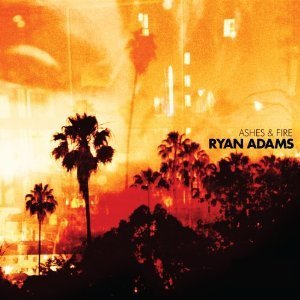"It ain't rainin anymore": A review of Ryan Adams' Ashes and Fire
 If it seems like just a few months ago we were talking about Ryan Adams, that's because we were. Dude comes out with an album like every other day. He's the Woody Allen of the music world–only, Adams' work is consistently, mind-bogglingly good (and yes, that's an unnecessary but nonetheless justified jab at Mr. Allen; Vicky Cristina Barcelona was a load of crap–you know it, I know it, the world knows it).
If it seems like just a few months ago we were talking about Ryan Adams, that's because we were. Dude comes out with an album like every other day. He's the Woody Allen of the music world–only, Adams' work is consistently, mind-bogglingly good (and yes, that's an unnecessary but nonetheless justified jab at Mr. Allen; Vicky Cristina Barcelona was a load of crap–you know it, I know it, the world knows it).
Whereas his previous album III/IV showcased the songwriter's bubbly indiepop side, Ashes and Fire finds Adams returning to the same soft, brooding, folksy aesthetic that made his first solo album Heartbreaker such a hit. It's infuriating enough that he's able to flip-flop so easily between styles (did you know that during his downtime in recording III/IV he wrote and produced a sci-fi metal album about interstellar warfare? Seriously. It's called Orion, for chrissake), but even more infuriating is the fact that he does it so well.
The songs are unabashedly basic, stripped-down, raw; the instrumentation is minimal. Tunes like "Save Me" and "Kindness" are driven by simple melodic hooks that, while not necessarily jaw-dropping, offer just enough cleverness to hold your attention. Then you've got songs like "Dirty Rain," which resonates with rich, haunting imagery that cleverly belies the song's relaxed sound:
Last time I was here you were waiting/ You're not waiting anymore
The windows broke and the smoke's escaping/ a book's scattered across the floor
and the church bells ringing through the sirens/ and your coat was full of bullet holes
Last time I was here you were waiting/ You ain't waiting anymore.
But the real winner here is the title track "Ashes and Fire." It's a loping honky tonk number full of jangly guitar and a rowdy piano melody. Like all of the songs on the album, it is brief, uncomplicated, buzzing with images and ideas that refuse to coalesce into a single concept but instead demand that the listener interact, however briefly, in order to summon a "point." And this, I think, is one of Adams' largley unsung talents: his ability to craft songs that are both utterly simple and wonderfully complex. In the same way that Gram Parsons was able to get such economy from only a few chords, Adams' work is pointedly straightforward, accessible, at least in terms of melody; the complexity arises from the listener's interpretation: he isn't interested in handing us just a lovelorn narrative like some of his alt country contemporaries. Rather, Adams offers us a bouquet of poetics, sometimes seemingly at random, in each song; what we do with it is up to us, but whatever we come up with is guaranteed to move us.
melody. Like all of the songs on the album, it is brief, uncomplicated, buzzing with images and ideas that refuse to coalesce into a single concept but instead demand that the listener interact, however briefly, in order to summon a "point." And this, I think, is one of Adams' largley unsung talents: his ability to craft songs that are both utterly simple and wonderfully complex. In the same way that Gram Parsons was able to get such economy from only a few chords, Adams' work is pointedly straightforward, accessible, at least in terms of melody; the complexity arises from the listener's interpretation: he isn't interested in handing us just a lovelorn narrative like some of his alt country contemporaries. Rather, Adams offers us a bouquet of poetics, sometimes seemingly at random, in each song; what we do with it is up to us, but whatever we come up with is guaranteed to move us.











